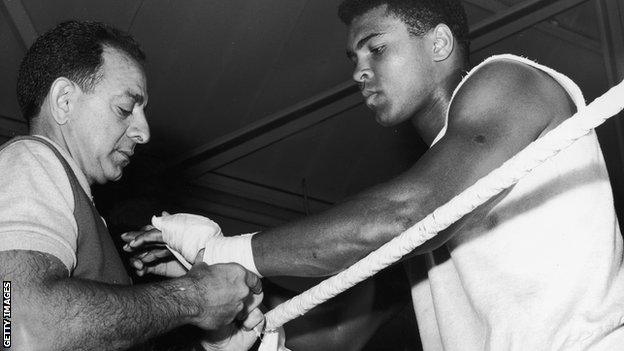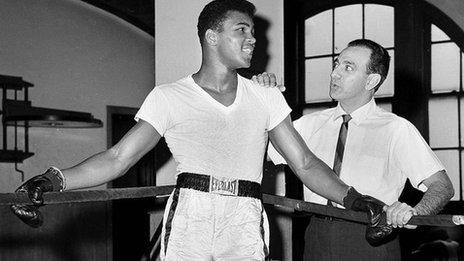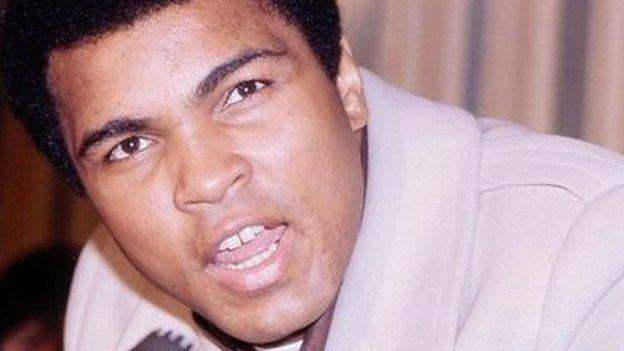Angelo Dundee: So much more than the man in the corner
- Published

Dundee was a mentor as well as trainer for the young Muhammad Ali
Some boxers prosper because of their trainer. Others get there despite him. There's no doubting the impact Angelo Dundee made - on boxers and boxing.
His work with Muhammad Ali and Sugar Ray Leonard stamps him as one of the greatest trainers of all time. Sure, Ali and Leonard were blessed with rare gifts, but even genius needs harnessing and Dundee played a pivotal role in shaping significant chunks of the sport's history.
That Ali and Leonard kept him by their side for so long is testament to his influence and importance.
He was headhunted to nurture the then Cassius Clay in December 1960. Clay was one fight into his professional career, having won Olympic gold in Rome earlier in the year, and already there were concerns that he was running loose and in need of a bridle, in and out of the ring. Dundee was brought in as boxing's version of the 'Horse Whisperer'.
He was with Ali for "The Fight of the Century" against Joe Frazier in 1971, "The Rumble in the Jungle" with George Foreman in 1974 and "The Thrilla in Manila", the third showdown against Frazier, a year later. He loved the circus that boxing had become, revelled in the hype and the bluster, taking the view that silence was a crime in the build-up to a big fight.
There are trainers who excel in the gym but crumble on fight night because of a failure to handle the pressure generated by the atmosphere and the occasion. Dundee was equally adept in each sphere.
In times of peril, he openly admitted to untying boxers' bootlaces between rounds to buy more time to treat the stricken pug. Such was Dundee's proficiency in the dark arts, he was able to create a myth around Ali's fight against Henry Cooper at Wembley Stadium in 1963.
Cooper decked Ali (then still billed as Clay) late in the fourth round and when Ali stumbled back to the corner, Dundee extended a tear in one of Ali's gloves. Legend has it that the ploy gave Ali more time to recover.
The BBC radio recording of the fight proves that the one-minute interval was prolonged by only three seconds. But Dundee was not about to allow the facts to dilute his claim and for years he was credited with salvaging Ali's career.
Much more critical to the forging of Ali was Dundee's response to a crisis in the next fight, against Sonny Liston for the world heavyweight title in February 1964. Ali returned to his stool after four rounds complaining of blurred vision. A substance, thought to be a form of liniment, had made its way from Liston's gloves to Ali's eyes.
"Cut off the gloves, cut off the gloves," screamed Ali. Dundee dragged him up by his trunks, sent him out for the fifth round and told him simply to run. Two rounds later, Liston retired on his stool. Ali was the champion. Dundee was the game-changer.
Angelo Dundee on life with Ali
For the rematch in Lewiston, Maine, a year later, Dundee caused havoc by insisting on a bigger ring than had first been erected. The smaller the ring, the greater the chance Liston had of closing in on Ali. Dundee got his way. Ali got the result.
In Kinshasa for the Foreman "Rumble", Dundee sent an acolyte to the arena early with an instruction to make sure the ropes were loosened. It was the night when Ali deployed his "rope-a-dope" tactics, standing and shipping punishment until Foreman punched himself dry. Foreman maintains to this day that Dundee won the fight for Ali.
In 1987, Leonard ended the long reign of Marvelous Marvin Hagler at middleweight. Leonard had been absent for three years, while Hagler was making the 13th defence of his crown and installed as the odds-on favourite.
Having studied videotapes of previous fights, Dundee noticed that Hagler shuffled slightly before he threw punches. The flaw was exploited by Leonard, who used his speed and guile to outfox the champion and claim a split points decision.
Dundee chose to pass on the credit to Leonard. In his autobiography, "I Only Talk Winning", Dundee points out that "plans and strategies meant nothing unless my guy had the talent, the brains and the bravery to carry them out".
Instilling confidence in his charge was another of Dundee's priceless qualities. When Foreman knocked out Michael Moorer in 1994 to become the oldest heavyweight title-holder in history, Dundee was perched in the corner.
Beforehand, pundits and the media forecast that Moorer, almost two decades younger, would be too fast for 45-year-old Foreman. "I seem to remember the Titanic was quicker than the iceberg," was Dundee's riposte.
A single quip, a single tip, can change a boxer's thinking. They came easily to Dundee. The best trainers make a difference. And he was high up among them.
- Published2 February 2012

- Published4 June 2016
